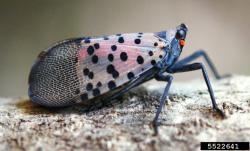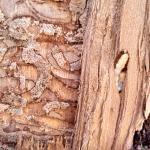 9:00 AM – 11:45 AM: Join UMass Extension’s Landscape, Nursery, and Urban Forestry Program and UMass Extension’s Fruit Program for an exciting FREE series of webinars focusing on the impact, monitoring, and management of invasive insects in Massachusetts and the nation! Topics to include browntail moth, spotted lanternfly, the biological control of emerald ash borer, invasive forest insects, invasive hornets, invasive agricultural pest updates, and more! Please note: while participants from anywhere are invited to attend, much of the material presented will be specific to Massachusetts and New England.
9:00 AM – 11:45 AM: Join UMass Extension’s Landscape, Nursery, and Urban Forestry Program and UMass Extension’s Fruit Program for an exciting FREE series of webinars focusing on the impact, monitoring, and management of invasive insects in Massachusetts and the nation! Topics to include browntail moth, spotted lanternfly, the biological control of emerald ash borer, invasive forest insects, invasive hornets, invasive agricultural pest updates, and more! Please note: while participants from anywhere are invited to attend, much of the material presented will be specific to Massachusetts and New England.
For recordings of previous webinars in this series, go to the archives at https://ag.umass.edu/landscape/education-events/invasive-insect-webinars.
CREDITS
Pesticide contact hours
For each day, 2 pesticide contact hours available for categories 25, 27, 29, 35, 36, 48 and Applicators (core) license.
Pesticide contact hours are available for the live webinars only, not for viewing the archived recordings.
Association Credits
2 ISA, 2 SAF (cat 1), 1 MCH credits for each day; CFEs vary with the date (2 cat 1 for 2/16, 1 cat 1 & 1 cat 2 for both 2/17 & 2/18); available for the live webinars only. 1 MCA and 1MCLP Education Credit for each day for both the live and recorded versions.
Agenda
WEDNESDAY, FEBRUARY 16, 2022
9:00 - 10:15 AM: Browntail Moth in Maine and What You Should Know
Tom Schmeelk, Entomologist 2, Department of Agriculture, Conservation, and Forestry, Maine Forest Service Insect and Disease Lab
Browntail moth is a non-native species that poses human health risks as well as concerns for forest health. This species is currently experiencing a population boom in Maine and may pose a risk in other states as it is a good hitch hiker. This presentation will cover lifecycle, history, current situation and what to look for as well as management and mitigation strategies.
10:30 -11:45 AM: Invasive Forests Insects in Massachusetts: Past, Present, and Future
Nicole Keleher, Forest Health Director, MA Department of Conservation and Recreation
Background on historic forest pests in the Commonwealth as well as a dive into current insects impacting our forest landscape, and discussion of the impact of climate change on invasive insect threats of the future.
Click here to register for this live webinar.
THURSDAY, FEBRUARY 17, 2022
9:00 - 10:15 AM: Research Updates on Emerald Ash Borer Biocontrol
Dr. Joseph Elkinton, Professor of Entomology, Dept. of Environmental Conservation, University of Massachusetts
 This presentation will discuss updates from the Elkinton Lab at the University of Massachusetts, Amherst, and their cooperators who are monitoring the establishment and impact of non-stinging parasitoid wasps for the biological control of the emerald ash borer (Agrilus planipennis - EAB). Exciting new data suggests that one such parasitoid (Spathius galinae) is having a real impact and reducing EAB larval densities in the field. Join to learn more from Dr. Elkinton!
This presentation will discuss updates from the Elkinton Lab at the University of Massachusetts, Amherst, and their cooperators who are monitoring the establishment and impact of non-stinging parasitoid wasps for the biological control of the emerald ash borer (Agrilus planipennis - EAB). Exciting new data suggests that one such parasitoid (Spathius galinae) is having a real impact and reducing EAB larval densities in the field. Join to learn more from Dr. Elkinton!
10:30 - 11:45 AM: Murdering the Hornets – An Overview of Eradication Actions in Washington State to Prevent the Establishment of Vespa mandarinia
Dr. Chris Looney, Entomology Laboratory, Washington State Department of Agriculture
Multiple North American detections of Vespa mandarinia, the world’s largest hornet species, has led to a multi-year survey and eradication program in Washington State and adjacent British Columbia. A combination of grocery-store items, high-tech equipment, and a massively engaged public has been deployed in the region with measureable success. This talk will outline our approach and why we feel cautiously optimistic – at least until next summer.
Click here to register for this live webinar.
FRIDAY, FEBRUARY 18, 2022
9:00 - 10:15 AM: Spotted Lanternfly Update from the Massachusetts Dept. of Agricultural Resources (MDAR)
Dr. Jennifer Forman Orth, Environmental Biologist, and Astra Perkins, Spotted Lanternfly Survey Lead, Massachusetts Department of Agricultural Resources
This presentation will provide an update about the status of spotted lanternfly (SLF) in Massachusetts. Learn more about what MDAR is doing in response to recent detections of this pest in Massachusetts and how you can monitor for and report any suspicious insects. Best management practices to prevent the accidental transport of SLF will also be discussed.
10:30 - 11:45 AM: Invasive Agricultural Pest Update from MDAR
Dr. Jennifer Forman Orth, Environmental Biologist, Massachusetts Department of Agricultural Resources
This presentation will discuss additional invasive insects of significance to agriculture, including box tree moth, citrus longhorned beetle, and brown marmorated stink bug. Identification, biology, and potential impacts of these pests will be covered.
Click here to register for this live webinar.
To be notified of upcoming webinar dates and topics, join our e-mail list at: https://ag.umass.edu/landscape/email-list.
This FREE series is supported by the Specialty Crop Block Grant Program at the U.S. Department of Agriculture through grant 21SCBPMA1011. Its contents are solely the responsibility of the presenters and do not necessarily represent the official views of the USDA. Use the links below to register for each day.